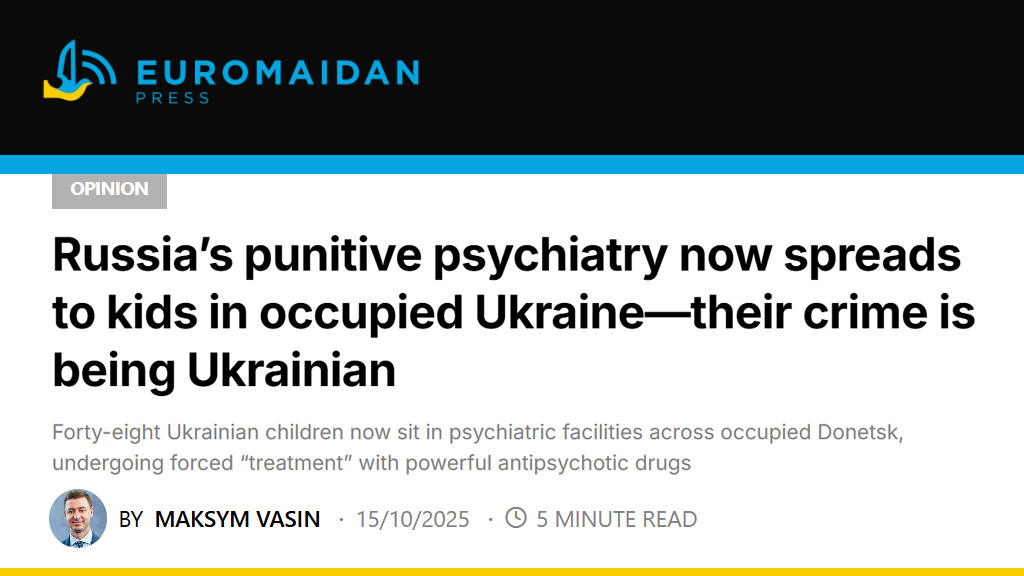Russia Brings Back Punitive Psychiatry

Dr. Maksym Vasin, Senior Researcher at the LYN Community, Ph.D. in Law
Putin’s regime has revived the practice of forced psychiatric treatment, once widespread in the Soviet Union, to suppress dissidents, anti-war activists, and even children and teens expressing pro-Ukrainian views. Clearly, this is not about medical care, but about destroying a person’s ability to perceive reality and to voice dissent against the lawlessness of the Russian authorities.
Last year, Russian courts already sentenced at least 49 people to compulsory psychiatric treatment for political reasons, according to the Memorial Human Rights Center. A significant number of them are anti-war activists who condemn the Russian invasion and airstrikes against Ukraine, which have caused numerous civilian casualties.
For example, 18-year-old anti-war activist Maksim Lypkan was accused in Russia of spreading so-called “fakes” (in reality, truthful information) about actions of the Russian army in Ukraine — a “crime” that carries a penalty of up to 10 years in prison. Instead of imprisonment, he was sent to compulsory psychiatric treatment on February 19, 2024, by a decision of the Odintsovo City Court of the Moscow region. “The criminal case against the accused was terminated due to his insanity at the time of the offense. … Compulsory medical measures have been applied to him in the form of forced treatment in a medical institution providing inpatient psychiatric care of a specialized type,” the Russian state propaganda agency TASS quoted a court representative as saying.
A similar fate befell Maria Semerenko, a designer from the Moscow suburb of Korolyov, who consistently opposed Russia’s war of aggression against Ukraine and regularly posted information on social media about the course of the war and the war crimes committed by the Russian army. In October 2022, Russian authorities arrested her on charges of spreading “fakes” about the Russian army (Article 207.3, Part 2 of the Criminal Code of Russia). The criminal investigation was opened after her Instagram post about the genocide of Ukrainians committed by Russian soldiers in the town of Bucha near Kyiv. Instead of issuing a guilty verdict, the court ordered her to undergo compulsory treatment in a psychiatric hospital. The Memorial, guided by international criteria, recognizes Maria Semerenko as a political prisoner and considers the measures applied against her to be an example of punitive psychiatry.
“The scenario is the same in all such cases — at some point, the accused is declared insane and sent to a psychiatric hospital,” the human rights defenders highlighted. They note that political prisoners are beaten, humiliated, and injected with powerful drugs such as haloperidol, typically used to treat schizophrenia, manic states, delusional disorders, and psychoses. Victims may remain under “treatment” until they “recover,” which in practice means indefinitely. This allows Russian authorities to place dissidents in psychiatric hospitals for many years without any formal sentence. Putin’s regime is physically eliminating all forms of opposition and dissent, especially in response to resistance against Russia’s war of aggression against Ukraine.
Even more alarming, it has recently become known that Russian authorities in the occupied Ukrainian city of Donetsk have extended this practice to children with pro-Ukrainian views. In the occupied territories, Russian forces have developed clear markers to identify all “disloyal” Ukrainians, including children and teenagers. This is highlighted in the Analytical Report “How Russia Erases Ukrainian Identity Under the Pretext of Combating Extremism,” presented on August 26, 2025, in Kyiv.
Russia openly states that the ultimate enemy of its so-called “special military operation” is not only Ukraine, but also the United States and the entire Western world. In all Russian strategic documents, Ukraine is portrayed as the main source of “extremist threats.” To pursue these goals, Russian authorities in occupied Ukrainian territories carry out measures under the guise of “counter-extremism,” masking them as protection of public order. Maria Krasnenko, the author of the report and an expert at the Almenda Center for Civic Education, emphasized this during the presentation.
According to her, the Russian authorities employ all possible methods of systemic persecution, with a special focus on children and youth. Education and state-controlled youth policy are their main tools in the so-called fight against “extremism.” According to official Russian data from Donetsk, 161 minors have already been prosecuted, 48 of whom were subjected to forced psychiatric treatment. Children also face administrative punishments, including fines.
The facts leave no doubt that Russia’s war against Ukraine clearly bears the hallmarks of genocide, evidence of which the Russian authorities seek to conceal from both their own people and the residents of the occupied Ukrainian territories. The return of punitive psychiatry, tragically infamous since the Soviet era, demonstrates the determination of Vladimir Putin’s dictatorial regime to isolate anti-war activists and other dissidents. It also aims, quite literally, to erase from their minds any oppositional criticism about Russia’s war crimes in Ukraine and the will to resist brutal repression inside the country. This is precisely why the Western democratic world must not only maintain but intensify its support for Ukraine—so that Russia’s machinery of repression and violence does not extend further across Europe.
The opinion published on Euromaidan Press